Nyíregyháza Basket Community (Nyíregyházi Kosár Közösség)
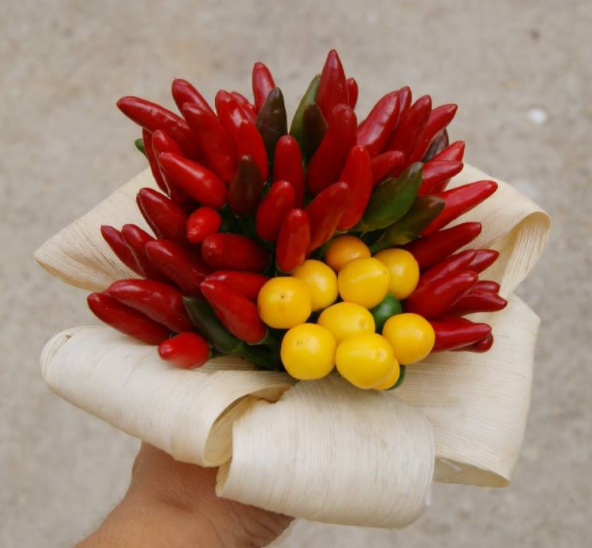
The aim of the Nyíregyháza Basket Community is to organise, reorganise and restructure the local economy. Producers of real local products are connected to customers who strive to consume with sustainability in mind, strengthening the local economy, creating real jobs and enriching the community in the local economy cycle.
Key words: local economy, cooperation, conscious consumption
Short description
Name of the initiative? Nyíregyháza Basket Community (Nyíregyházi Kosár Közösség)
Country Hungary
Region Nyíregyháza
What kind of initiative Marketing, environmental, community
The Story
In Hungary, the vast majority of people consume non-local food, so money is migrating out of communities and local economies are declining. An initiative like The Basket can provide an answer to these problems.
“…the vast majority of people consume non-local food, so money is migrating out of communities and local economies are declining”
It started as discussions about the situation in the world during the 2008 crisis in Nyíregyháza. In 2012, the idea of a shopping community grew out of a series of friendly conversations between local cultural creatives. Cultural creatives do not want to belong to any of the political camps, but they are active, socially sensitive, and many of them feel alone. After a few meetings, it turned out that food was the issue that preoccupied everyone. The idea of the shopping community was just a step away. In 2013, several individuals and one of the engines of the local community, the ‘Our Future is Local’ Association (Helyben a Jövőnk Egyesület), began to act and became the core of the shopping community.
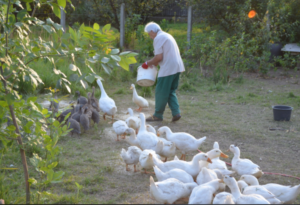 Producers receive community members at their farms or sites and showcase their production processes. The Basket Community is committed to environmentally friendly and healthy food, and such products are favoured in purchasing.
Producers receive community members at their farms or sites and showcase their production processes. The Basket Community is committed to environmentally friendly and healthy food, and such products are favoured in purchasing.
40-60 producers deliver products for the Basket (the number varies seasonally). At the start, volunteers from the Basket were looking for farmers who could be involved, but now typically producers come and indicate that they want to join the system. Now, the Basket can’t even take everyone in, a new producer can only enter, if one of the products is just in short supply.
As it started, the first five refrigerators operating at the distribution point were obtained from people offering devices they no longer used. Locations were also acquired several times through offerings. The Basket needs a new centre relatively often: due to continuous growth. Now they’re renting a small former grocery store, but even this is starting to get small again.
The Basket operates a web shop, where producers can upload what they have to offer, and customers can select and order what they need until Wednesday 11pm. The system forwards the orders to the producers, who deliver the ordered products by the Friday delivery day. Community volunteers put together a named box for each customer based on orders, on Fridays. The volunteers of the Basket take over the products along with the receipts from producers and they pass them on to the customers on Friday afternoons. It is important that the volunteers of the Basket do not buy the products from the producers, because then the VAT exemption for primary producers would be lost, if they did so. They just take products and receipts over. All details are included in contracts available on their website. When handing over the products, they take over used egg boxes, jars and even used cell phones from the customers, thus also performing environmental protection tasks. There is a local entrepreneur from whom empty bottles are also taken over.
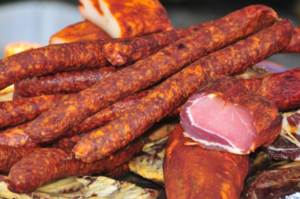 In addition to connecting producers and consumers, they also carry out awareness-raising activities. Trainings are organised, a knowledge base has been created. The topics of the trainings include presentations for farmers and rural developers (business planning, community enterprise, local money, green farming, straw bale architecture, renewable energy, etc.) In addition, they have trainings for conscious consumers and trainings for the innovative, conscious entrepreneurs.
In addition to connecting producers and consumers, they also carry out awareness-raising activities. Trainings are organised, a knowledge base has been created. The topics of the trainings include presentations for farmers and rural developers (business planning, community enterprise, local money, green farming, straw bale architecture, renewable energy, etc.) In addition, they have trainings for conscious consumers and trainings for the innovative, conscious entrepreneurs.
Lectures are being held across Hungary on how to create shopping communities. The long-term goal of trainings and networking is to develop strong local shopping communities and networking of Hungarian shopping communities. In such a network, regular knowledge sharing, joint marketing and joint quality assurance can further strengthen local initiatives, and so local economies.
The initiators are committed to environmentally friendly and healthy foods, they prefer such products during the operation of the Basket. They organise a community, which gives the spirit of the initiative. The members of The Basket community are the customers, the producers and the eager volunteers, who make the system work.
“The members of The Basket community are the customers, the producers and the eager volunteers, who make the system work.”
Producers are welcome who undertake ‘open farming’, i.e. to receive members of the community and present their production processes, if someone is interested. Customers are welcome, who consciously shop and feel responsible for the local economy.
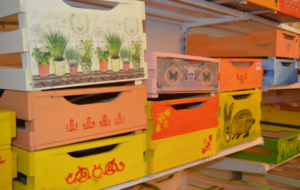 On an average Friday, 15-20 volunteers help the work of the Basket, and this is the biggest grant the community can get. For years, many people have provided their working time for the project for free. The volunteer team includes retirees, but also people of working age, business leaders, farmers and entrepreneurs who have flexible work time, so they can help on Fridays.
On an average Friday, 15-20 volunteers help the work of the Basket, and this is the biggest grant the community can get. For years, many people have provided their working time for the project for free. The volunteer team includes retirees, but also people of working age, business leaders, farmers and entrepreneurs who have flexible work time, so they can help on Fridays.
The Basket does not charge a commission for the products sold, the transaction takes place exclusively between the buyer and the producer, but both buyers and farmers can donate to the association of volunteers. This has been generating enough money to cover annual expenses, such as overheads or the accountant’s salary.
“Initially, there were producers who immediately understood what the Basket was all about and enthusiastically joined, but many were suspicious. Some were nervous even about the word ’cooperation’. There have been a lot of scams in Hungarian agriculture already, and the small producers have no real interest representation, they think they have to fight each other…”
Initially, there were producers who immediately understood what the Basket was all about and enthusiastically joined, but many were suspicious. Some were nervous even about the word ’cooperation’. There have been a lot of scams in Hungarian agriculture already, and the small producers have no real interest representation, they think they have to fight each other, although they are not each other’s competitors.
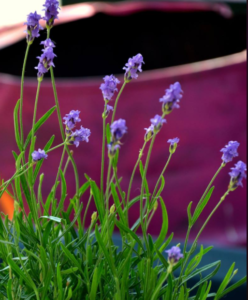 At markets of other cities, there are cases where some vendors refer to themselves as primary producers, but they buy products brought from abroad in the wholesale market and pass it on. They would not be able to do this in the Basket: producers must undertake, when concluding a contract, to have an open farm, i.e. they are visited from time to time by members of the Basket. Photo reports are made about these visits. There are people in Nyíregyháza who, although not customers of the community store, search for producers in the market based on the reports of their blog.
At markets of other cities, there are cases where some vendors refer to themselves as primary producers, but they buy products brought from abroad in the wholesale market and pass it on. They would not be able to do this in the Basket: producers must undertake, when concluding a contract, to have an open farm, i.e. they are visited from time to time by members of the Basket. Photo reports are made about these visits. There are people in Nyíregyháza who, although not customers of the community store, search for producers in the market based on the reports of their blog.
Thanks to six years of working together, now there are several producers who are especially proud to be the suppliers of the Basket. Out of the 117,000 inhabitants of Nyíregyháza, the Basket currently supplies food to roughly 150-170 families. This is not yet enough for producers of the system to make a living only from this, so most of them sell products at markets too. But there are already producers for whom The Basket has become their main source of income, and some others, who used to have to do other jobs besides agriculture, while today they can be full-time farmers.
“…there are already producers for whom The Basket has become their main source of income…”
Recently, several group discussions were organised with producers and buyers, so it became clear to them that it is not the price, but the price-value ratio that is really important for the customers. The customers of the Basket are willing to pay for the good quality if they know that the chicken laying the eggs indeed scratched. It is not true that local products would be more expensive than goods available in supermarkets and multinationals.
“It is possible to build a stable community with noble goals and concrete results.”
The initiators see that it makes sense to do this work. In the huge headwind, despite the global consumer culture, real results are being achieved. It is possible to build a stable community with noble goals and concrete results. However, managing volunteers needs to be handled well both on an organisational and human level. They always gave attention to volunteers devoting time to recognise their needs.
“…managing volunteers needs to be handled well both on an organisational and human level. They always gave attention to volunteers devoting time to recognise their needs.”
The Basket implements a multi-stakeholder business model: the producer is given the market, the buyer is given good quality food, and the volunteers are given the social mission. Getting to know buyers and local farmers is also a goal of the project: though customers do not receive products directly from the producers (as farmers would have to dedicate their entire Friday afternoon to this), but sometimes they invite a producer for a tasting for customers on Friday.
“The Basket is also a learning community, stopping regularly and looking back to discuss what is not working perfectly, what could be done differently.”
The Basket is also a learning community, stopping regularly and looking back to discuss what is not working perfectly, what could be done differently. For example, there were a few producers who did tricks, sold their products in The Basket more expensive than they sold on the market, and it became widespread that The Basket was expensive, and the number of customers started to decrease.
In response, a voluntary price guarantee system was introduced: producers were offered the opportunity to undertake not to sell their product more expensive than they would anywhere else, and if they did, the difference would be reimbursed to customers. The proposed contract amendment, together with the turnover statistics of previous years, was sent to the producer, and in the end most of them undertook the price guarantee.
During the COVID-19 pandemic, the Basket made many times its normal turnover, as people turned their attention to local food. The extraordinary workload was hardly borne by the volunteers. They had to shut down for a while but reorganised their operations and have now resumed their activities.
The Nyíregyháza Basket Community has been operating successfully since May 2013, setting an example for similar initiatives in many other settlements. During their operation:
- about 150 families and 50 producers participated in more than 300 handover days
- about 20 volunteers organise all actions
- a ‘Golden Egg’ crowdfunding program has been launched to help local producers
- trainings are held nationwide
- The kosarkozosseg.hu website was created and is operated by the Nyíregyháza Basket Community and the Our Future is Local Future Association, with the aim of helping to strengthen the Hungarian shopping communities and start more communities.
- The Basket has now become one of the largest shopping communities in Hungary
Ambitions for the future:
- To become better known in and around Nyíregyháza
- To see local products become a significant part in the consumption of the residents of Nyíregyháza and its surroundings, which will bring a more vibrant local economy, better livelihoods and brighter prospects for all of them
- Make the Basket Community economically sustainable
- Reach out to other communities
- Create new communities through community work, in the structure of production and consumption. Local production can create jobs, e.g. tomatoes can be obtained not from 2,500 km but from 2 km, packaging costs could be reduced. This can give an answer to global challenges.
Additional information
http://www.nyiregyhazikosar.hu/
https://www.facebook.com/nyiregyhazikosar/
https://shop.nyiregyhazikosar.hu/
Sources:
https://444.hu/2019/10/26/bevasarlo-kozossegkent-indultak-de-az-egesz-gazdasagot-megvaltoztatnak
Repository compiled in September 2020 by: Palicz Ildiko, Andrea Szabadkai & Péter Kajner
E-mail contact: nyiregyhazikosar@gmail.com
Photographs used with permission.
